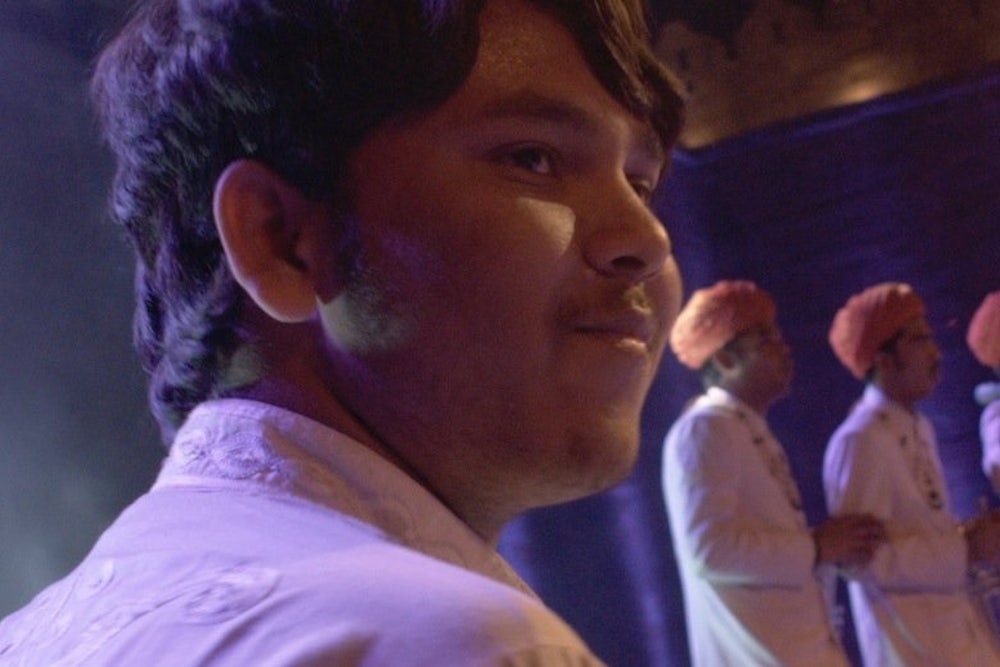Junun, the frustrating new documentary by Paul Thomas Anderson, was filmed in the private chambers of a fifteenth-century fort overlooking Jodhpur, a city in northern India. The film opens with a long shot of musicians—one English, one Israeli, and 19 Indian—sitting in the palace, preparing to play. We leave the walls of Mehrangarh Fort only a few times: a couple shots of the city through fort windows, brief visits to local shops, and some kitschy drone footage of the landscape. Perched on a cliff, Junun unfolds in a vacuum untouched by any cultural context.
If at times the 54-minute film feels like video outtakes from an album’s special box set, that’s because it more or less is. Earlier this year, Radiohead guitarist Johnny Greenwood and Israeli singer Shye Ben Tzur traveled to India to record an album with a group of local musicians who go by the name The Rajasthan Express. (The album, also titled Junun, will be released in November.) Anderson, who has collaborated with Greenwood on many of his movie’s soundtracks, went along with his camera.
What drew Greenwood to this musical collaboration in Jodhpur? How do Greenwood and Ben Tzur forge a musical understanding with the local musicians? The documentary, which premiered last week at the New York Film Festival and is currently available to stream online at mubi.com, doesn’t bother to let us know. Anderson keeps the focus tightly on the music, while displaying almost no interest in the people writing and performing the music, or in the musical traditions they represent.
It’s not that the film required the tedious exposition of a travel documentary. What context would have added is narrative—something Junun sorely lacks. Unlike, say, Let It Be, there are no setbacks, breakthroughs, or revelations—or at least Anderson doesn’t capture them. And unlike Wim Wenders’s Buena Vista Social Club, which tells the story of Cuban music through a recording of a single album, Junun never widens its lens. With few talking heads or onscreen captions to guide us, we have only the recording process itself.
The problem with this direct approach is that Western audiences are unlikely to be acquainted with Junun’s 19 Indian musicians, who are not very famous even on a domestic level. Anderson provides a few minute-long interviews with them, but this barely does justice to their skills or their distinct traditions. (Irritatingly, translators are not used, and so the Indians are forced to speak in unpolished English.)
Without that context, the audience might not realize that Junun depicts the fusion of over five distinct musical cultures. There are the singers like Gufran Ali and Razia Sultan, steeped in the Qawwali music of Sufi Islam. (Western audiences had previously been introduced to Qawwali through Jeff Buckley, who has covered the ecstatic music of his hero, the Pakistani maestro Nusrat Fateh Ali Khan.) The Dholak, Kamaicha, and Nagara players come from the ancient Muslim community of Manganiars, who live in the deserts of Rajasthan and are known for their folk musicians. And then there are the seven members of Indian brass bands, which have their roots in Western music and owe their origins to public entertainment—weddings, street processions, and Bollywood. They are joined by Ben Tzur, who first heard Indian classical music as a teenager at a festival in Jerusalem and has since established his career as an Israeli singer of Qawwali, composing his lyrics in Hebrew and performing with Rajasthani musicians.
These styles are fused together to create the textured, mounting, and cyclical song structures that we hear. Qawwali music is generally considered a higher cultural form than Magniar folk music, and both are seen as superior to brass band music. But these genres don’t clash; they build upon one another. Qawwali music has traditionally been associated with moments of understanding and religious ecstasy, and something of this remains through all the songs here. The brass instruments make the music more celebratory, and the Manganiar add rich textures. Ben Tzur himself reveals a deep intimacy with the structures of Indian music, and it is bracing to see how seamlessly his Western-influenced melodies combine with those of Indian string instruments like the Kamaicha and Sarangi.
There’s nothing novel about this brand of Indo-Western fusion music, with its meditative, social and celebratory themes. It has its roots in decades-old international collaborations: Zakir Hussain and James McLaughlin; Ravi Shankar with Yehudi Menuhin. The most unconventional element here is brought by Greenwood, whose bass-heavy guitar and synthesizer work gives Junun a raw immediacy; his digital loops turn these tracks from extended mood pieces into sturdily wrought songs.
But while American viewers might view the recording of Junun as another cliché meeting of East and West, this would ignore the incredible diversity within the members of The Rajasthan Express. At a time when India’s ruling party, the BJP, is intent on rebranding the country as a culturally Hindu nation, it’s a reminder of the many religions that have shaped Indian culture, as well as of the plurality of Islam itself.
